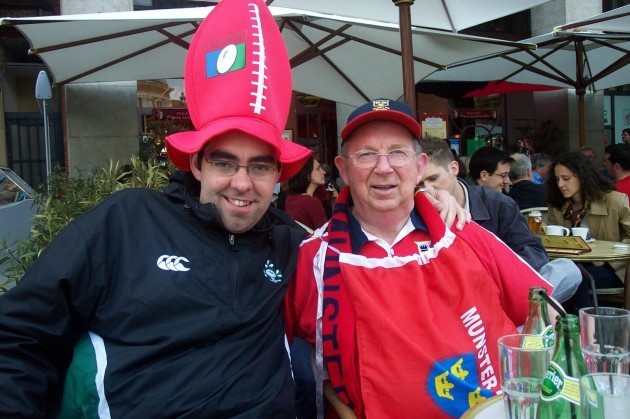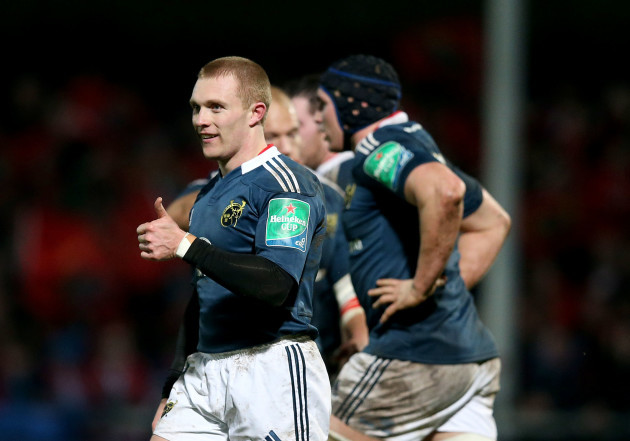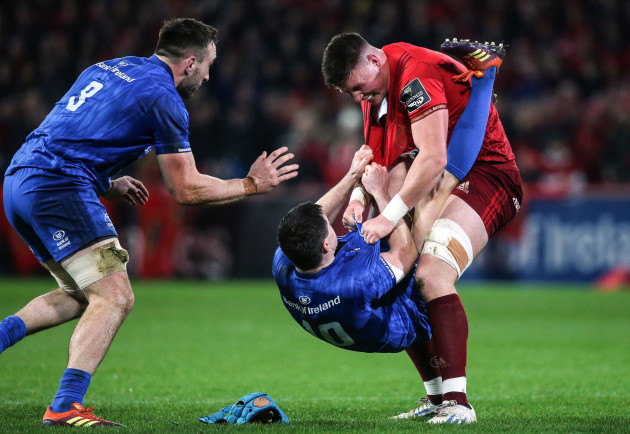YOUR LIFE NEVER really returns to normal when someone you love dies. All this talk about time being a great healer is all well and good until you stare at the empty chair and think about the kindness and the laughter that used to spring out of it.
But sometimes solace comes from different things. There were the daily visits to his wife’s grave, a routine that deepened the connection forged through years of marriage. There were children and grandchildren, photos and memories.
There was the pub and the shop they used to run together, Shanahan’s in Castleisland, a hub of the community as much as a place where people went for a drink.
Slowly days turned to weeks, weeks to months and months to years. “The stuffing was knocked out of him,” Robert Shanahan says of his father, John’s, loss.
Then something happened. One of the boys from the area –Mick Galwey – was doing well for Munster, in keeping with the tradition of a part of Kerry that had already produced Mick Doyle, Tom Doyle and Moss Keane.
And it was an easy thing for John to identify with, not so much the sport but the sight of one of your own battling the sporting prejudices that suggested teams like Munster should always lose to bigger-spending clubs from England and France.
This journey that Galwey and Munster were setting off on in the winter of 1999/2000 was about something deeper than rugby. Really it was about people coming together through the medium of sport to share their love for one other and their province.
“We were lucky,” Robert, John’s son, says, “to have that time together. And what I found about all these trips that we went on was that it made him feel young again.
“Only the other day I was looking at photos from that time, and the lovely thing about it was the sight of my father looking so happy in those pictures. The rugby – Munster, those trips – brought him out of himself after mammy had gone because he was surrounded by younger people and was a part of this lovely community that sprung up around Munster games.”
Each time he went abroad for one of those games, John shopped for a souvenir, a pennant, a baseball hat or a flag, all the way up to April 2006, when suddenly he fell ill. A trip to hospital resulted in the surgeon saying he needed a stent inserted into his heart. “Will I be okay to go to the final?” John asked.
“All things being equal, you will,” he was told.
If only. He went into hospital on a Monday, was operated on the following day and died that Friday. Two weeks later, after six years knocking on the door, Munster finally won the Heineken Cup. And two weeks after that, that giant-sized trophy quietly made its way to John and Kathleen Shanahan’s grave. “What I like about this story,” Robert says, “is the fact that even in an era of professionalism you can have this huge organisation which still has a family aspect to it. It was such a simple thing letting us have that trophy. But it meant so much.”
**
Open your ears and you’ll always hear someone tell you how sport has a fairly low ranking in life’s list of priorities. And in 2020, with the entire planet failing to get to handle on this pandemic, you will do well to find an audience of sympathetic counsellors waiting to offer their condolences to rugby fans missing their match-day fix.
Perhaps the sceptics should be a little less cynical, though, because the moment you take supporters out of stadiums is the moment you steal the soul from a club and remove something valuable from the community.
In these harrowing circumstances when there is scientific evidence that sporting occasions double up as super spreader events, a closed doors policy is unquestionably the only course of action any government can take. “We have to do what’s right,” says Mark Meehan, chair of the Munster supporters club, “and unfortunately that means staying away from the matches. We miss it, of course we do. How could you not? ”
What is missing is not just the sight of people sitting in the stands or standing on the terraces. It is the knowledge that you won’t see mothers and daughters, fathers and sons milling around on the streets outside; the colours and the laughs, the camaraderie and the love, stories like the one Robert Shanahan tells about his father.
Donal Doherty remembers the first time he took his son, Kieran, to a Munster away game. Kingsholm, 2014. He can visualise the walk towards the ground, the good-humoured interaction with the Gloucester fans, the scarves tightly wrapped around their necks to stop the January wind biting at their skin, the relief of getting a spot near the front of The Shed so that Kieran could get a decent view of the game.
There was the joy that followed when Keith Earls scored the opening try; the dejection when Charlie Sharples wiped that lead out just before half-time. Then there was the singing, the sound amplified by The Shed’s unique acoustics; not to mention Munster’s typically stubborn second-half performance and game-changing try from Peter O’Mahony. There was the roar at the final whistle when victory was confirmed and there was the little glance down at his 10-year-old son’s face, a realisation of how much these moments mean to a parent and a child.
That is what will be absent tonight, not just in Thomond Park but everywhere. This standard cliché that rugby is nothing without players is only partially true because once you remove fans from grounds, the only thing that remains are echoes and ghosts.
**
The modern Munster rose out of the game going professional, the Heineken Cup adding glamour and depth to the fixture list, the tactical cunning of a hard-nosed pack resulting in a few bodies and egos getting bruised in French and English playing fields.
There was the prolonged chase to conquer Europe with a flock of supporters following them on the pilgrimage. Devotees like Doherty miss going to their church; up the steps of the West Stand to row N, seat 188, in front of the couple from Tralee, to the left of the person from Roscrea, behind a couple from Killarney. They know each other on first name terms.
They remember moments. Toulon, 2018. They’re in their seats when Andrew Conway catches the ball on the touchline in front of them, and on their feet by the time he dances his way past their eyeline. Then when he touches down for the match-winning try, they all hug and embrace. “Kieran, my son, is 16 now and has been coming to matches with me for years,” says Doherty, a season ticket holder. “You just can’t buy those father-son memories; the Andrew Conway try; the Fineen Wycherley tackle on Sexton; the first trip we went on together to Gloucester.
“It’s rugby, yes, but it is more than that. It’s just a feeling …. and I’m sure they experience it in Old Trafford or Anfield too, a feeling that when you get into that ground, see the grass, see the name Munster on the seats of the stand opposite, it’s just special. Pride. That’s the word, I’m looking for. You’ve a deep pride in the place.”
To non-believers in sport, this may very well make little sense. If you looked at this sort of devotion dispassionately, you’d see thousands of people shouting and roaring at a group of men who will only wear the jersey for a certain length of time.
There and then you may recall that old Seinfeld joke about how a sports fan really only supports a piece of fabric – a gag that makes you smile but also gets on your nerves.
Because the essence of being a supporter – irrespective of whether it is Munster or any other team – is the unity and togetherness that comes from being part of a community; it’s the shine from the floodlights on a winter’s night; the feeling you get when there’s a lull in the game and this guy called Kevin – who always stands on the same spot in the west terrace – breaks into voice. “Within seconds you get everyone in the ground singing,” says Meehan, the chair of the supporters club. “And you know, sometimes you think you are mad, investing all this energy and all this money into something.
“But sometimes you feel you make a difference.”
That’s why they do it. For that feeling, that sense of belonging to something, for those friendships, those ties that bind families together, the adrenaline you get from match night, the edginess that comes when games are close. “Some of my best memories,” Meehan says, “aren’t the big games but are the nights when it is lashing rain, when it’s Zebre, when the team needs to know you are behind them.
“Sometimes you stay behind, after a hard defeat, and you clap the players onto the bus because that’s what being a supporter is about. Rugby is that sort of game; it is about the collective, about helping out your mate.
“Personally, I find it an easy commitment to make and I’m sure Leinster, Ulster and Connacht fans are the same, because it’s rewarding to feel a part of something. Match-nights, ah, they’re all special. I’ve been doing this for years, got sucked into the whole thing over 20 years ago. The thing that got me was the fact that even though we are a province, it feels like a village, a parish mentality.”
This evening, for the first time since lockdown began and Covid-19 became part of our everyday conversations, Thomond Park will host a Munster game. The lights will be on but no one will be home. There won’t be people on the streets; won’t be groups spilling out of the pubs with their pints and their craic; there won’t be sing-songs and laughter. And it won’t be the same. How can it be? Without players, you may not have a game but without fans, there’s no joy, no energy and no connection. It isn’t just for financial reasons that rugby needs them back.




